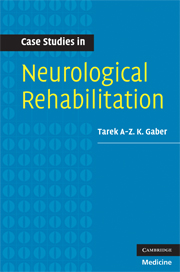Book contents
- Frontmatter
- Contents
- Preface
- Part I Clinical rehabilitation
- Part II Case studies
- 3 Medical issues in brain injury rehabilitation
- 4 Progressive neurological disorders
- 5 Medical complications of immobility
- 6 Orthotics in neurological rehabilitation
- 7 Ethical and medicolegal controversies
- 8 Chronic pain
- 9 Medically unexplained disorders
- 10 Spasticity management
- 11 Ventilatory support in rehabilitation
- 12 Sphincteric dysfunction
- 13 Communication disabilities
- 14 Sensory disability
- 15 Prescriptions for independence
- Part III Exercises in neurological rehabilitation
- Index
7 - Ethical and medicolegal controversies
from Part II - Case studies
Published online by Cambridge University Press: 13 August 2009
- Frontmatter
- Contents
- Preface
- Part I Clinical rehabilitation
- Part II Case studies
- 3 Medical issues in brain injury rehabilitation
- 4 Progressive neurological disorders
- 5 Medical complications of immobility
- 6 Orthotics in neurological rehabilitation
- 7 Ethical and medicolegal controversies
- 8 Chronic pain
- 9 Medically unexplained disorders
- 10 Spasticity management
- 11 Ventilatory support in rehabilitation
- 12 Sphincteric dysfunction
- 13 Communication disabilities
- 14 Sensory disability
- 15 Prescriptions for independence
- Part III Exercises in neurological rehabilitation
- Index
Summary
In the last few decades, scientific medicine has evolved in an unimaginable way enabling clinicians to help their patients with either curative measures or with highly effective treatments to relieve their symptoms. However, the same period witnessed the development of new concepts such as human rights and patient's autonomy, which in conjunction with the widespread dissemination of medical information, has empowered patients and put them in a better position to challenge their doctors and question their judgements.
In rehabilitation practice, most decisions are made following a discussion with the patient. Goal setting, in particular, is meaningless if the explicit support of the patient for the goal suggested is not secured. Within such atmosphere, conflicts are not uncommon. The patient may focus on walking as a priority, while the clinicians may feel that independence in self-care is more important as it will help the sitting balance and eventually help the patient achieve his goal of walking. Another patient with detruser sphincter dyssynergia of the bladder may underestimate the risk of renal failure and refuse an inconvenient but safe way to manage his bladder.
Disagreements and conflicts are also common with families and carers, who are often under incredible stress and need significant help to cope with a life-changing event. Occasionally, carers may put pressure on the patient to accept measures with which he/she is not comfortable, leaving the cliniciansin a very sensitive position.
- Type
- Chapter
- Information
- Case Studies in Neurological Rehabilitation , pp. 82 - 90Publisher: Cambridge University PressPrint publication year: 2008



